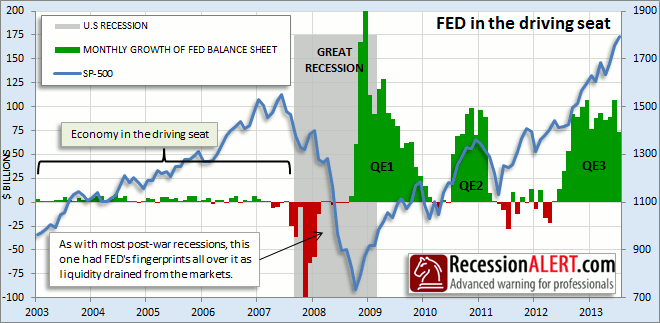The chart below shows how the FED is firmly in the driving seat for the U.S stock markets through the monthly growth of their balance sheet, primarily through the purchase of U.S Treasuries and Mortgage Backed Securities. You can clearly see why talk of tapering sends shudders down everyone’s spine:

It is interesting to note that in the prior economic expansion, the economy and company earnings clearly were in the driving seat – the good old days when good news was good news for the stock market and the FED was a by-stander. As with many recessions before 2008, rising interest rates and contraction in the fed balance sheet assisted the recession on its way. Only when things got really bad in late 2008 did some huge injections come to the Fed balance sheet – a trigger for the new bull market. Each time QE “tapered off” since 2009, it had a clear impact on the stock market.
However as demonstrated with QE1 and QE2, it seemed that the stock markets only reacted adversely once Fed balance sheet injections dropped below $50bn per month. With the current 3-month average of roughly $90bn per month it would appear that, assuming history will repeat itself, that QE needs to taper by 40-50% before real damage to equity markets manifest themselves. One thing is sure though – the days of the U.S economy propping up the market on its own without QE tailwinds are unlikely to be repeated before a major 15-25% correction “resets the landscape.”

Comments are closed.